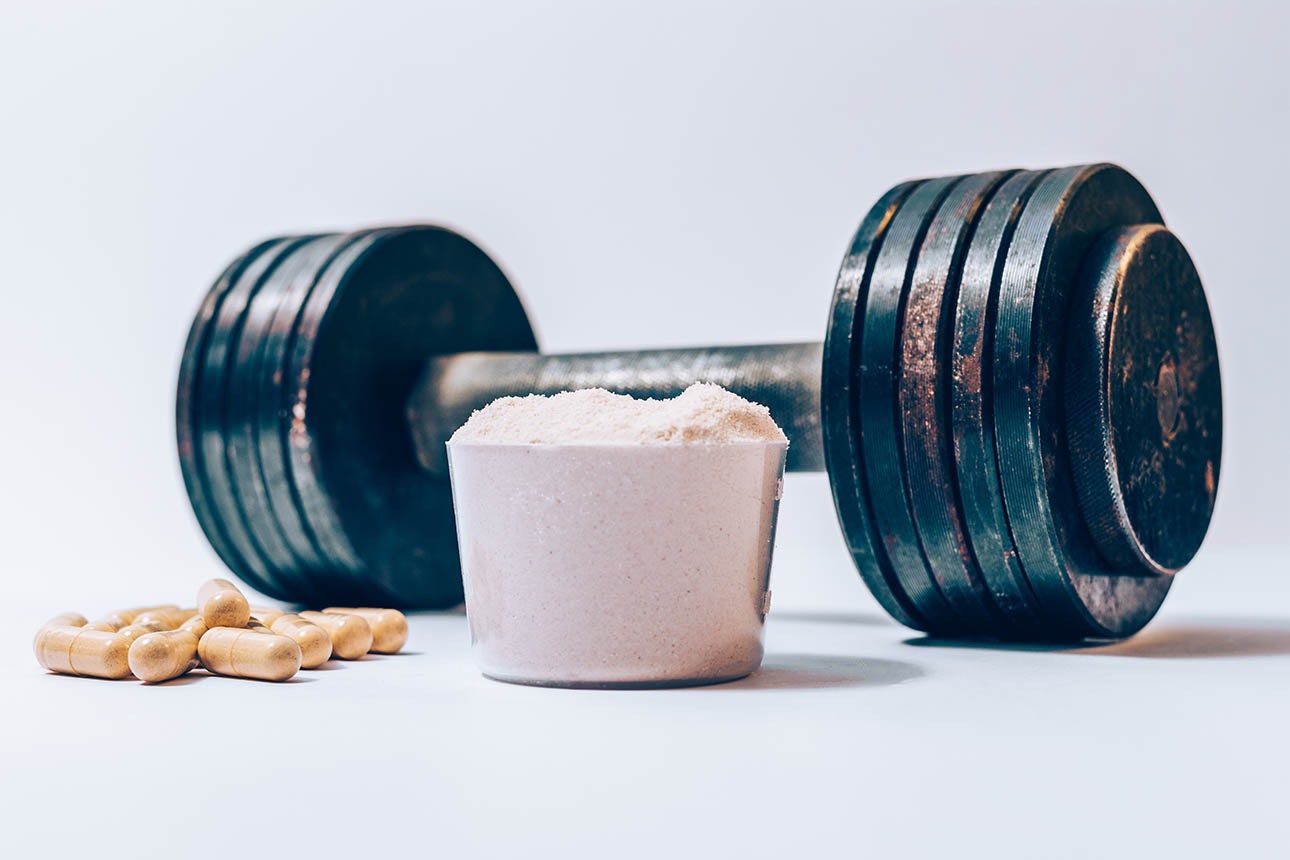
By Belinda Castles
Researcher | Kairangahau
In 2022, New Zealanders forked out $135 million on vitamins, minerals and herbal extracts at the supermarket, according to Nielsen IQ scan data.

We’ve asked consumers who take natural health products such as vitamins, minerals and natural remedies, what they take and why they take them. We’ve also
asked whether they research the claims before they buy.
What are we taking?
In the past 12 months, 55% of people in our survey had taken a multivitamin (which contains vitamins and minerals) and 54% had taken vitamins. The most common mineral taken was magnesium (consumed by 39%), followed by iron (27%), zinc (20%) and calcium (15%).
Two-thirds (66%) of the respondents who had taken vitamins took vitamin C in the past 12 months. Vitamin D (34%), vitamin B12 (25%) and vitamin B (24%) were also popular.
Omega fatty acids were taken by 18% of respondents, while 16% took probiotics. The most popular plant extracts were garlic (14%), aloe vera (13%), ginger (13%) and turmeric (12%).
More than half (51%) responded that they take supplements or natural remedies every day, with 25% taking them a few times a week.
Of the 329 respondents who have children, 41% said their children take supplements or natural remedies. The majority (86%) take vitamins, 23% take probiotics, 13% take omega fatty acids and 12% take minerals. More than half (55%) take them in the form of a chewy sweet, like a gummy bear.
Buying supplements and natural remedies
About half the people in our survey said they buy supplements and natural remedies at the supermarket (49%) or pharmacy (47%). Other retailers include online stores (18%), health food stores (15%) and large chain stores, such as The Warehouse (8%).
Only 6% of respondents said they buy products from their GP, and 5% bought from a natural health practitioner such as a naturopath or rongoā practitioner.
In terms of cost, nearly half the respondents (49%) said they spend less than $20 per month on supplements or natural remedies, with 42% spending $20 to $50. Only 9% spend $50 or more.
Only one-third of shoppers (33%) said they often or always research product claims before they buy. When it comes to getting information about products, more than half (59%) use the internet. Others get advice from a pharmacist (28%), friends and family (23%) and a GP (21%).
More than half (59%) of respondents get information about a product from the internet.
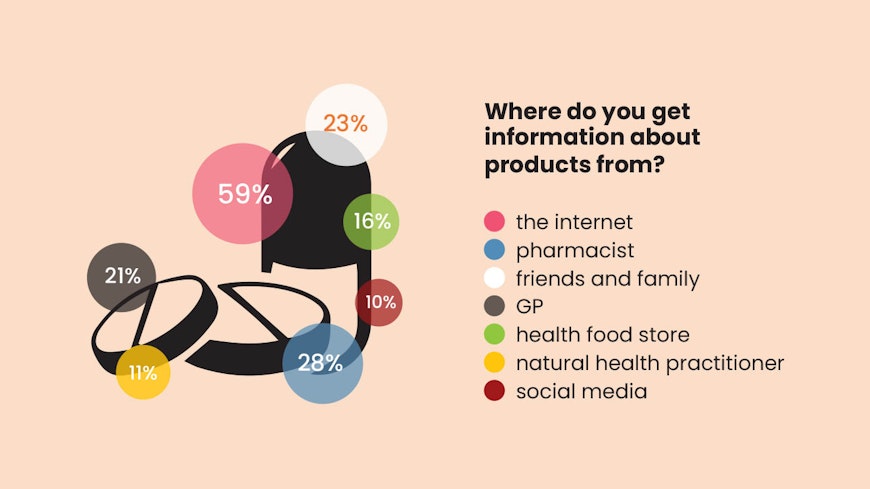
Attitudes to supplements and natural remedies
About half the respondents in our survey said they are somewhat, very or extremely concerned about the safety, effectiveness, ingredients and quality of dietary supplements and natural remedies.
A similar number said they are concerned about the health effects of long-term use and the risks of taking them with prescription and non-prescription medicines.
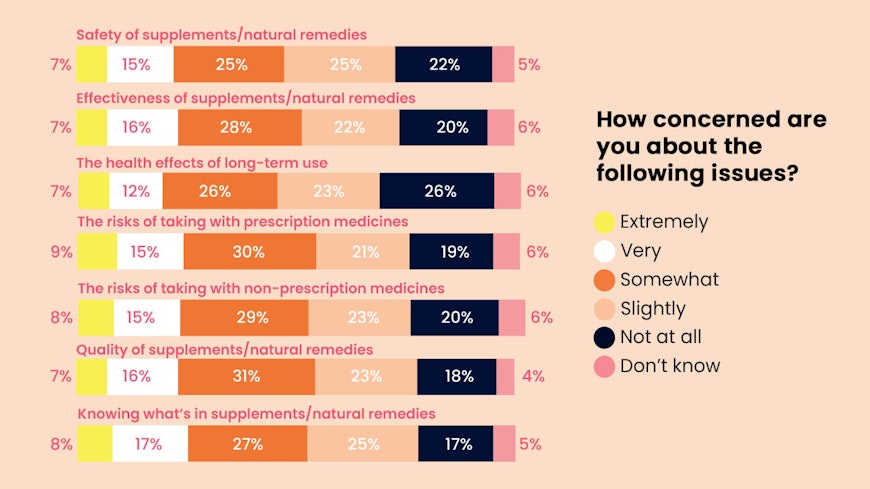
Slightly less than half (47%) agreed that the level of research into natural remedies and supplements is acceptable, while 14% did not agree.
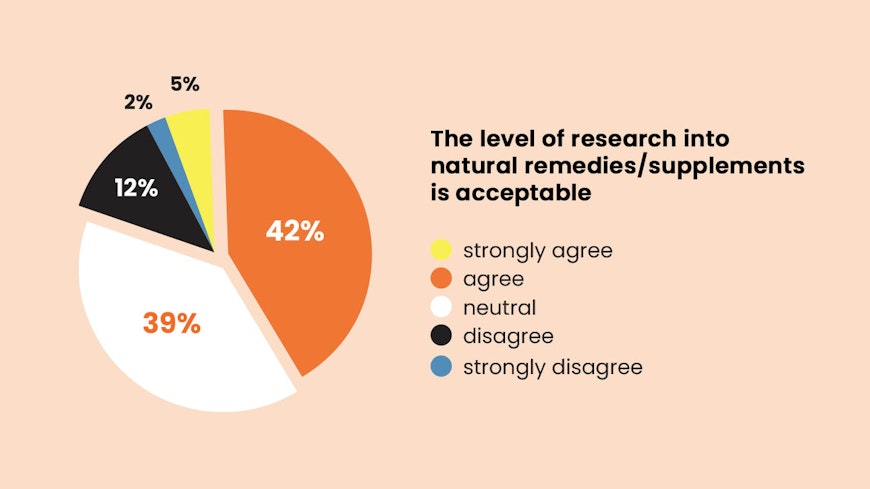
One-quarter (25%) agreed that you cannot take too much of a natural remedy or supplements, while 51% disagreed. The majority of people agreed that natural remedies or supplements are safe to use if consumed as recommended (73%) and may interact with prescription medicines (67%).
More than half (52%) of respondents agree they can trust the labels. One in ten don’t trust the labels.
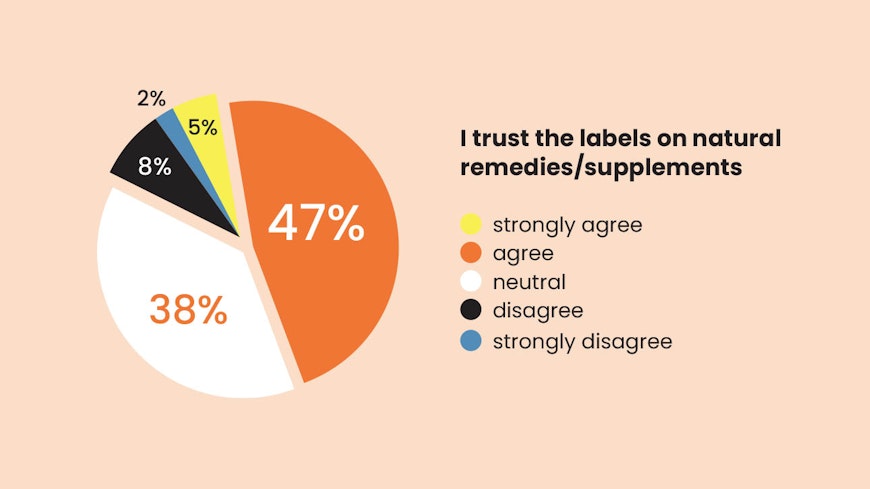
Why do people take supplements and natural remedies?
Nearly half the respondents said they take supplements or natural remedies because they promote good health (19%), or to give a boost in case their diet isn’t providing adequate nutrients (17%) or when they are feeling run down or stressed (12%). Only 11% take them because a GP recommends them.
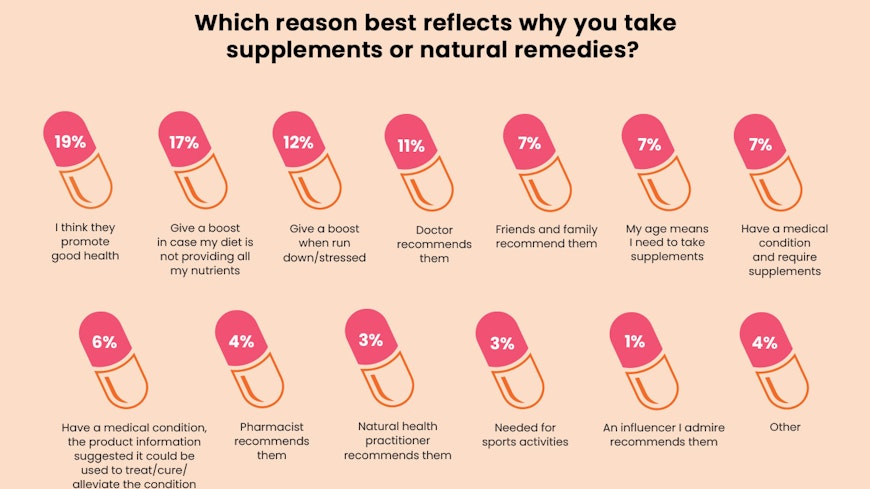
Half of the respondents (50%) said they take a supplement or natural remedy for a condition, health issue or lifestyle need. Of those, less than one-third (31%) said it was for a vitamin or mineral deficiency. Other reasons given included for joint health (27%), sleep (24%), energy (23%), immunity (23%), gut health (20%) and mental health or anxiety (19%).
More than a third (35%) agreed that natural remedies or supplements aren’t necessary if you eat a balanced diet, while 22% disagreed with this statement.
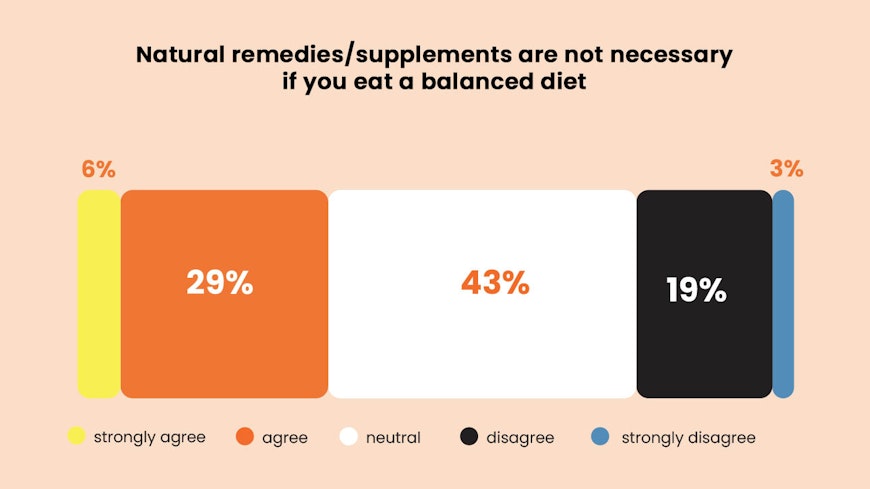
Registered dietitian and senior lecturer in nutrition at the University of Auckland Dr Rajshri Roy said most people should be able to get all the vitamins and minerals they need by eating a balanced diet (containing plenty of fruits, vegetables and whole grains), rather than turning to dietary supplements. These supplements are also more expensive.
“Vitamin and mineral supplements don’t convert poor food choices into a healthy diet,” she said.
“Research examining the effects of nutrients from food and supplements shows more benefits with nutrients from foods that are not seen with single nutrient dietary supplements. Also, supplements with high levels of some vitamins and minerals may be harmful.”
Dr Roy said consumers are better putting the money they’d spend on supplements towards the food budget, although there are some exceptions.
“Certain groups may benefit from taking appropriate quantities of specific supplements when prescribed by a healthcare provider” Dr Roy said.
“These include the elderly, pregnant and breastfeeding women (and those planning a pregnancy), people with specific allergies and food group avoidance, and those with dietary restrictions that may lead to nutrient deficiencies.”
The Ministry of Health recommends all pregnant women take folic acid-only and iodine-only supplements.
GUIDE Our data are from a nationally representative survey of 1001 New Zealanders, aged 18 years and older, carried out online in November 2022. Figures may add to +/- 100% due to rounding.
Therapeutic Products Bill
Last year, the Government introduced the Therapeutic Products Bill to parliament, which will regulate natural health products, among other things. Natural health products cover everything from vitamin and mineral supplements to traditional and herbal remedies.
We’re pleased the bill includes these products – we’ve been asking for an overhaul of the lax dietary supplement regime for years.

Subscribe to our newsletters
Get even more Consumer NZ news and invitations to share your voice on important issues straight to your inbox. You don’t have to be a member to have these newsletters emailed to you regularly.
